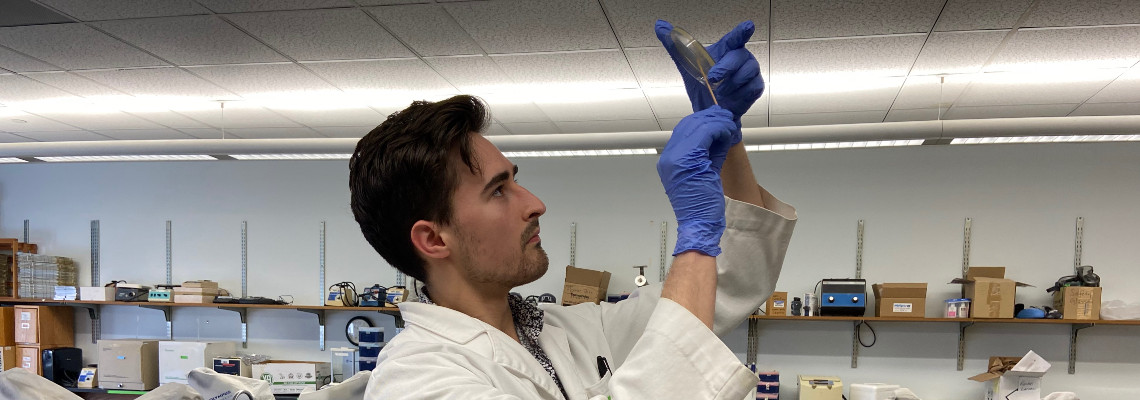The M.S. program in Biology at USM is designed to meet the diverse interests of potential students and to give them additional preparation for specialized careers in the life sciences. The program is aimed at three groups of students:
- those who want to continue the scholarly pursuit of the biological sciences and possibly continue with a Ph.D. or M.D.;
- those desiring laboratory or field experience to make them more competitive for employment; and
- those teaching or those who wish to teach at the secondary school or community college level.
To meet the diverse needs of these students, the M.S. program in Biology offers breadth in its coursework offerings, yet it maintains an individualized approach with its research requirement. Coursework and research opportunities span the subdisciplines of cell and molecular biology, developmental biology, evolutionary genetics, physiology (animal, plant, and microbial), ecology (animal, plant, and microbial), and environmental science.
The thesis, tailored to individual interests and falling within the specialty area of a faculty mentor, is intended to give students experience in scientific investigation. In addition to exposure to the current state of knowledge within the subdiscipline, students learn the skills necessary for creative scientific inquiry. These include exploration and evaluation of the scientific literature, experimental design, implementation of original laboratory or field-based research, statistical analysis of data, and the writing of a publishable scientific paper. Thus, students graduate from the program as knowledgeable scientists who have contributed to the field of biology.
When to apply
Applications and supporting materials received by 1 February will receive priority status for Fall admission and consideration of departmental financial support. The application deadline for Spring admission is 15 October. Students applying for Spring admission are less likely to obtain graduate assistantships in their first semester because most financial aid will be distributed during Fall admission.
What are the admissions criteria?
Admission to the Biology program is competitive. Preferably, applicants would have earned a baccalaureate degree in the life sciences (e.g., Biology, Botany, Environmental Science, Microbiology, Natural and Applied Science, Zoology) from an accredited institution with a minimum GPA equivalent to 3.0. Admission is dependent upon a faculty member agreeing to serve as advisor to the student. Therefore, students should review our page of faculty research interests.
Is the Graduate Record Examination (GRE) required?
Scores for the General Test of the GRE are optional.
What are the program requirements?
This degree provides two thesis options: research and literature review. Most students are expected to produce a research thesis; however, an individual, with approval of their Advisory Committee, could undertake the literature review option, which requires writing a comprehensive review paper. All master’s candidates preparing a research thesis must complete a minimum of 24 credits of course work and 6 credits of thesis research. Candidates completing the literature review option must complete 32 credits of course work, which must include at least one laboratory course, and 3 credits of literature review. Coursework is determined individually for each student in consultation with the student’s Advisory Committee.
During the first semester, students are required to declare a research topic and an Advisory Committee. The committee consists of the student’s advisor and at least two other faculty members.
All students must take five required courses (15-18 credits):
- Applied Biostatistics (BIO 513)
- Research Methods in Biology (BIO 601)
- Two different sections of Graduate Seminar (BIO 621)
- Either Thesis Research (BIO 698) or Literature Review (BIO 697)
Students also choose electives:
- To maintain breadth, electives are required in at least two of three areas:
- Organismal Biology
- Cell and Molecular Biology
- Ecology and Evolution
Upon approval of the Advisory Committee, students also may take graduate level courses in other departments.
At the end of the program, the research thesis or literature review must be written in a form suitable to submit to a peer-reviewed scientific journal, and the results must be presented in a seminar open to all university faculty, students, and the general public. After the presentation, the student and Advisory Committee meet to discuss details of the project, paper, and seminar.
Is financial aid available?
Graduate assistantships may be available on a competitive basis for students interested in the thesis option and attending full time (9 credits per semester). Graduate assistants would be expected to teach introductory lab sections each semester in addition to doing their own coursework and thesis research. Research assistantships may be available to students working with particular faculty who have funding available. Funding is also available for student research on a competitive basis. The Financial Aid Office is a good source of information on other funding sources for graduate students.For an application or more information on graduate study at USM, please contact the Office of Admissions at 207-780-5670, or visit Apply to USM.


